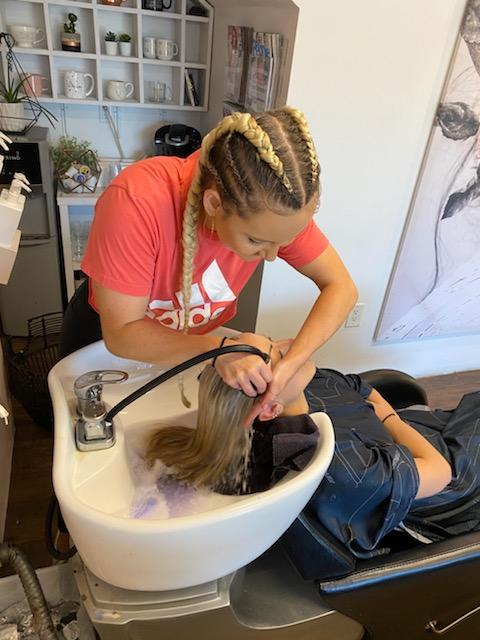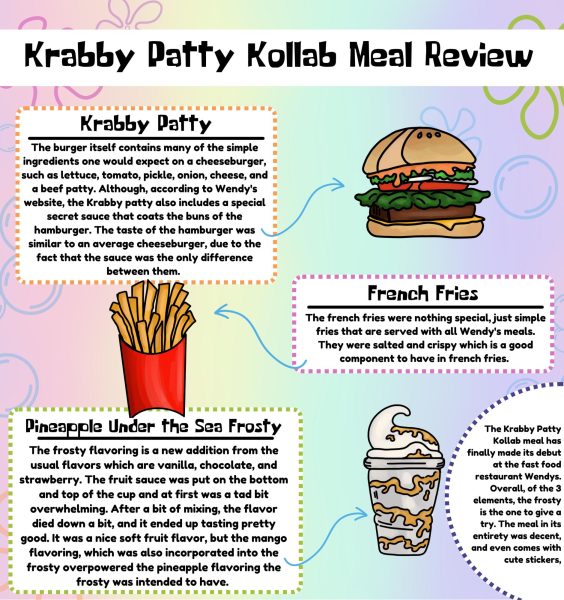Blurred line between economical and essential
After failing to produce any adequate response after being nailed by reporters questioning what makes cosmetology services essential, Gov. Doug Ducey finally removes hair and nail salons from the “essential services” list. But why did this change come so late? And, more importantly, why were hair and nail salons considered “essential” in the first place?
Viola Rosa hairstylist Hailey Hull washes a client’s hair, unable to adhere to the six-foot rule Gov. Ducey says all essential services will follow.
The uncertainty and fear that has enveloped the world at this time is immeasurable. With an unprecedented pandemic invading the lives and routine of the American people, state and city governments find themselves in a perpetual race to defeat the spread of a virus before the damage becomes irreparable.
To combat this issue, 46 states have implemented some form of a stay-at-home order as of Apr. third, according to a graphic by The New York Times. These stay at home orders encourage citizens to remain housebound with the exception of leaving for essential services.
However, controversy arises when reading what Arizona Gov. Doug Ducey deems as essential. Cambridge Dictionary defines “essential services” as, “basic public needs, such as water, gas, and electricity.” Although these essential services are included on the official list that Gov. Ducey published, there are a handful of other services that are questionable. This includes golf courses under the “Outdoor Recreation Activities” section if they adhere to certain food and beverage guidelines and all forms of construction work.
Although construction work may be deemed essential in the case of constructing more hospitals and medical centers given the threat of shortages, it is important to mention that there are no restrictions on what construction services may be executed. This implies that construction companies can still work on infrastructure for services that are considered non-essential rather than provide aid or work on essential services.
The lack of restriction on construction companies in particular can likely be explained by the fact that it is the third most-employed business in Phoenix according to a study conducted by Statistical Atlas.
Rather, Americans and people in authority are thrown into a predicament in which they must choose between benefiting the economy in attempt to lighten a potential crash that will likely occur after this pandemic, or encourage people to stay at home by closing non-essential jobs and enforce social distancing rules to potentially slow the spread of this virus. Both of these choices will help the initial goal chosen, but harm the other.
Viola Rosa hair stylist, barber, and esthetician located in Scottsdale, Jaimi Dolmage, found herself in this same situation as of a mere few days ago, when cosmetology services were labeled as “essential.”
“Being listed as an essential service…has made me feel like I have to choose between putting myself and my clients into [harm’s] way, or face serious financial hardship,” Dolmage says.
After days of grueling backlash and dodging questions from various reporters questioning why beauty services such as hair and nails are considered essential, Gov. Ducey has finally succumbed to the pressure put upon him and re-classified them as non-essential on Apr. third, and ordered they all be shut down by 5 p.m. on Apr. fourth.
When Gov. Ducey released his initial list of essential services on Mar. 23rd, hair, nails, and barbering was listed as essential under the umbrella term of “personal hygiene.” Almost immediately, various mayors, citizens, and reporters statewide criticized Ducey about why these beauty services were considered essential when failing under the definition of “essential.”
Gov. Ducey further elaborated by saying that essential services, “shall establish and implement social distancing and sanitation measures.”
These social distancing and sanitation, including the six-foot rule, measures are impossible for beauty salons to implement most of the time. Hair styling, in particular, is a very hands-on type of trade, and stylists are often intimately close with their clients in all stages of the styling process.
In fact, given new information emerging by NPR and others, COVID-19 may be airborne, this further affects stylists given that talking and interacting with the client is a crucial component of the hair-styling process. Because of this new information, the CDC now recommends that everyone wear a mask in public regardless if they are exhibiting symptoms.
“My client or I could exchange the virus quite easily merely by breathing or speaking closely to one another…any one of my clients at any time could bring it in for me to share with the rest of my clients and my family. It’s horrifying,” Dolmage explains regarding this new information.
What is most concerning about the entirety of this situation is Gov. Ducey’s loose definition of “essential services,” even outside of hair and nails. It is also quite concerning that a luxury service was even considered essential. Although some may argue that it is mere hygiene, the definition of what is considered hygienic becomes skewed when addressing that personal hygienic care varies person to person. A hairstylist may be able to cut hair in accord to what a client may want, but maintaining the hair’s hygienic nature is in the hands of the client themselves. In addition, even if some are to disregard that, hygiene is independent of hair length or color, and although hygiene may be considered essential to a person’s well-being in general, a haircut and blonde highlights are not.
In conclusion, it is important to draw the line between what is economically beneficial and what saves lives. Although it is alarming that it took this long for Gov. Ducey to condense his “essential services” list, we must realize that the lives of the American people are crucial for our future and providing solutions to this crisis.

Isabel Behrendt is a senior and is a third-year newspaper student and double-truck editor. This year, she will be covering world language. When she is...


